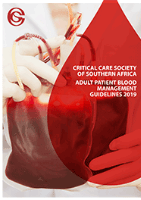
Southern African Journal of Critical Care
Scope & Guideline
Advancing critical care knowledge for better patient outcomes.
Introduction
Aims and Scopes
- Clinical Research in Critical Care:
The journal publishes studies that investigate clinical practices, treatment outcomes, and care protocols in intensive care units (ICUs), providing valuable insights into how to improve patient management. - Nursing and Interprofessional Education:
A significant focus is placed on the roles of nursing and interprofessional collaboration in critical care, emphasizing the importance of education, training, and communication among healthcare teams. - Public Health and Policy Implications:
The journal also explores the broader implications of critical care practices on public health, including the impact of healthcare policies, resource allocation, and educational programs in resource-limited settings. - Innovative Technologies and Methodologies:
Research on the application of new technologies and methodologies in critical care, such as telemedicine, advanced monitoring systems, and the use of artificial intelligence, is highlighted to promote innovation in patient care. - Patient and Family-Centered Care:
The journal emphasizes the importance of involving patients and their families in care decisions, aiming to enhance the overall experience and outcomes for critically ill patients.
Trending and Emerging
- Impact of COVID-19 on Critical Care:
Research addressing the effects of the COVID-19 pandemic on ICU practices and patient outcomes has surged, highlighting the need for adaptations in care protocols and resource management in response to global health crises. - Mental Health and Wellbeing of Healthcare Professionals:
There is an increasing focus on the mental health and wellbeing of critical care staff, driven by recognition of the stresses associated with working in high-pressure environments, particularly in the context of the pandemic. - Patient-Centered Outcomes and Experiences:
Emerging studies emphasize the importance of patient-centered care, exploring patients' perceptions of ICU experiences and the role of families in care decisions, thereby aligning practices with contemporary healthcare values. - Nutritional Support in Critical Care:
The relevance of nutrition support practices in the ICU setting is gaining attention, reflecting a growing understanding of the critical role nutrition plays in patient recovery and outcomes. - Use of Advanced Monitoring Technologies:
Research into the application of advanced monitoring technologies and their impact on patient management and outcomes is on the rise, indicating a trend towards more sophisticated and data-driven approaches in critical care.
Declining or Waning
- Traditional Diagnostic Techniques:
There seems to be a decrease in research centered around traditional diagnostic methods as newer technologies and approaches gain prominence, reflecting a shift towards innovation and efficiency in critical care diagnostics. - Basic Clinical Skills Training:
Papers focused solely on basic clinical skills training for healthcare professionals are less frequent, indicating a possible shift towards more advanced training and educational interventions that prioritize critical thinking and evidence-based practices. - Generalized Critical Care Protocols:
Research on generalized protocols for critical care management appears to be declining, with an increasing focus on tailored, individualized approaches that consider patient-specific factors and local contexts.
Similar Journals
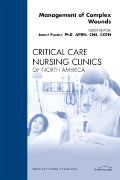
Critical Care Nursing Clinics of North America
Transforming Insights into Exceptional Patient Care.Critical Care Nursing Clinics of North America, published by W B Saunders Co-Elsevier Inc, stands as a leading journal in the field of critical care nursing, showcasing groundbreaking research and essential clinical practices since its inception in 1989. With an ISSN of 0899-5885 and an E-ISSN of 1558-3481, this quarterly publication has earned its reputation within the Q2 category of critical care nursing, ranking 13th out of 27 in the Scopus metrics. Its contributions significantly aid healthcare professionals in enhancing patient outcomes in critical settings through the dissemination of evidence-based knowledge, innovative approaches, and expert insights. Although it does not offer an Open Access model, the journal remains dedicated to serving researchers, practitioners, and students in understanding advancements and best practices within this dynamic specialty, with a focus on improving the quality of care in critical nursing environments.
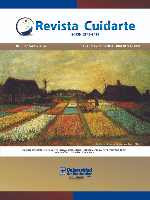
Revista Cuidarte
Promoting Accessibility in Critical Care ResearchRevista Cuidarte is a distinguished Open Access journal published by UNIV SANTANDER in Colombia, aimed at advancing the fields of Community and Home Care, Critical Care and Intensive Care Medicine, Family Practice, and Nursing. Since its inception as an Open Access platform in 2010, this journal has become an essential resource for researchers, healthcare professionals, and students, promoting the dissemination of high-quality, peer-reviewed research. With a scope that encompasses diverse nursing disciplines and healthcare practices, Revista Cuidarte plays a pivotal role in enhancing understanding and innovation in patient care. Despite being categorized in the Q4 quartile for some categories and Q2 for Nurse Assisting in 2023, it actively contributes to the academic discourse through its commitment to accessibility and scholarly rigor, thus serving as a valuable outlet for emerging research ideas and practices. The journal is indexed in Scopus, highlighting its regional and international relevance.
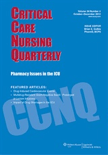
Critical Care Nursing Quarterly
Shaping the Future of Critical Care NursingCritical Care Nursing Quarterly is a distinguished journal published by Lippincott Williams & Wilkins, catering to the vital field of critical care nursing. With an ISSN of 0887-9303 and an E-ISSN of 1550-5111, this journal has been contributing to the advancement of nursing practices since its inception in 1987. Over the years, it has gained recognition, earning a Q3 ranking in Critical Care Nursing for 2023 with a Scopus rank of #9 out of 27, placing it in the 68th percentile of its category. As a non-open access journal, it offers a curated selection of high-quality articles designed to disseminate critical findings, innovative practices, and essential reviews relating to nursing in critical care settings. The journal's ongoing commitment to improving patient care through research and education highlights its pivotal role in shaping the future of critical care nursing. For researchers, professionals, and students alike, Critical Care Nursing Quarterly serves as an indispensable resource in a field that impacts lives daily.

Clinical and Experimental Emergency Medicine
Delivering essential knowledge for emergency professionals.Clinical and Experimental Emergency Medicine, published by the SEOUL KOREAN SOCIETY OF EMERGENCY MEDICINE, is a premier Open Access journal dedicated to advancing knowledge and practice within the fields of emergency medicine and emergency nursing. With an ISSN of 2383-4625 and an E-ISSN of 2383-4625, this journal has established itself prominently in the academic community, achieving a notable Q2 ranking in both Emergency Medicine and Emergency Nursing categories in 2023. The journal is committed to providing highly relevant research, innovative clinical practices, and educational resources that address the urgent and evolving challenges in emergency care. With a vision to foster collaboration among researchers, practitioners, and students, it aims to contribute significantly to the body of knowledge that enhances emergency medical services and improves patient outcomes globally. Accepting submissions and offering Open Access since its inception in 2014, the journal is positioned as a key resource for those dedicated to the advancement of emergency medicine.
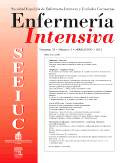
Enfermeria Intensiva
Enhancing Outcomes in Critical Care NursingEnfermeria Intensiva, published by Elsevier Science Inc, is a highly regarded journal in the fields of Advanced and Specialized Nursing as well as Critical Care and Intensive Care Medicine. With an impressive track record spanning from 1994 to 2024, this journal serves as a vital resource for researchers, healthcare professionals, and students dedicated to enhancing the quality of patient care in critical settings. It holds a coveted Q2 ranking in multiple nursing categories as of 2023, reflecting its influence and contribution to the ongoing discourse in nursing practices. Although currently not an open access journal, it continues to provide intricate insights into both fundamental skills and specialized techniques essential in intensive nursing care. By bridging research and practical application, Enfermeria Intensiva plays a pivotal role in advancing knowledge and improving outcomes in critical care environments.
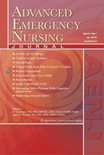
Advanced Emergency Nursing Journal
Elevating Standards in Emergency Nursing PracticeAdvanced Emergency Nursing Journal, published by Lippincott Williams & Wilkins, stands as a key resource within the domains of Emergency Medicine and Emergency Nursing. With a commitment to advancing the field, this journal provides a platform for rigorous research, critical reviews, and innovative practices aimed at enhancing patient care in emergency settings. Though it holds a Q3 ranking in both related categories as per the 2023 metrics, its global reach spans various aspects of emergency care, promising insights that are crucial for both professionals and academics alike. Covering topics from clinical procedures to policy analysis, the journal invites submissions that aim to bridge theory and practice, highlighting the importance of evidence-based approaches in emergency nursing. Researchers, educators, and healthcare practitioners can Find more information and explore their own contributions in a dynamic environment that continuously evolves with the field. Whether you're seeking to stay current with the latest advancements or to publish your findings, this journal is an essential asset for those dedicated to improving care in urgent medical situations.
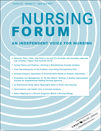
NURSING FORUM
Exploring Evidence-Based Practices for Optimal Patient Care.NURSING FORUM, published by Wiley-Hindawi, is a premier journal dedicated to advancing the knowledge and practice of nursing across diverse contexts. With an ISSN of 0029-6473 and E-ISSN 1744-6198, this esteemed journal has been a vital source of scholarly communication since its inception in 1961, serving researchers, practitioners, and educators in the nursing field. Recognized for its impactful contributions, it holds a prestigious Q1 ranking in Nursing (miscellaneous) and ranks #18 out of 139 in Scopus' General Nursing category, placing it in the top 87th percentile of its field. With its publication continuity from 1961 to 2024, NURSING FORUM promotes innovative research, evidence-based practices, and critical discourse essential for the nursing profession. This journal not only provides access to cutting-edge studies but also fosters a collaborative platform for healthcare professionals and academics to engage and share insights. Whether you are a seasoned researcher or a nursing student, NURSING FORUM is your essential gateway to the latest advancements and discussions that shape the future of nursing.

ANAESTHESIA AND INTENSIVE CARE
Exploring Innovations in Pain Management and Critical CareANAESTHESIA AND INTENSIVE CARE, published by SAGE PUBLICATIONS LTD, stands as a prominent academic journal in the fields of anesthesiology, pain medicine, and critical care. With an ISSN of 0310-057X and an E-ISSN of 1448-0271, this journal has been disseminating vital research findings since its inception in 1972 and continues to provide a platform for the latest advancements up to 2024. Ranked in the second quartile (Q2) for both Anesthesiology and Pain Medicine, as well as Critical Care and Intensive Care Medicine in 2023, its Scopus accolades position it favorably among peers, highlighting its impact and significance in the medical community. Although it does not offer open access, its rigorous peer-review process ensures high-quality content, appealing to a diverse audience of researchers, clinicians, and students dedicated to enhancing patient care in critical settings. The journal aims to foster knowledge exchange and encourage innovative research that addresses contemporary challenges in anesthesia and intensive care medicine, solidifying its vital role in shaping future practices and policies.
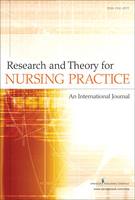
Research and Theory for Nursing Practice
Championing research-driven nursing practices.Research and Theory for Nursing Practice, published by SPRINGER PUBLISHING CO, is a pivotal journal in the field of nursing research and theory, dedicated to advancing the discipline through rigorous empirical investigation and theoretical exploration. With an ISSN of 1541-6577 and an E-ISSN of 1945-7286, it serves as a platform for nursing professionals, researchers, and students seeking to disseminate innovative ideas and evidence-based practices. Established in 2002, the journal continues to contribute significantly to the academic community, featuring articles that are aligned with contemporary challenges and developments in nursing practice. Although categorized as Q4 in Medicine (miscellaneous) and Q3 in Research and Theory in 2023, it holds a respected position within the nursing field, ranking #14 out of 18 in Scopus Nursing research and Theory. The journal emphasizes the importance of integrating research findings into clinical practice and is committed to fostering a meaningful dialogue among nursing scholars. Access is not open, allowing for a curated collection of high-quality research that is essential for enhancing nursing education and patient care. The journal's convergence from 2002 to 2024 showcases its enduring relevance, making it a crucial resource for those aiming to shape the future of nursing.
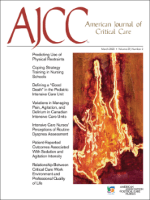
AMERICAN JOURNAL OF CRITICAL CARE
Enhancing understanding in the realm of critical care.Welcome to the American Journal of Critical Care, a premier publication dedicated to advancing the field of critical care nursing and enriching the understanding of critical care practices. Established in 1992 and published by the American Association of Critical Care Nurses, this journal serves as a vital resource for researchers, practitioners, and students alike, providing cutting-edge research, insightful reviews, and evidence-based practices that shape modern critical care. With an impressive impact factor and distinguished rankings—ranking in Q1 for Critical Care Nursing and Q2 for miscellaneous Medicine in 2023—this journal underscores its significance in the healthcare landscape. Although it does not currently offer Open Access, the American Journal of Critical Care remains committed to disseminating high-quality knowledge that drives innovation and improves patient care in critical settings. Join us as we explore the latest advancements and pivotal studies that influence patient outcomes and shape the future of nursing practice.